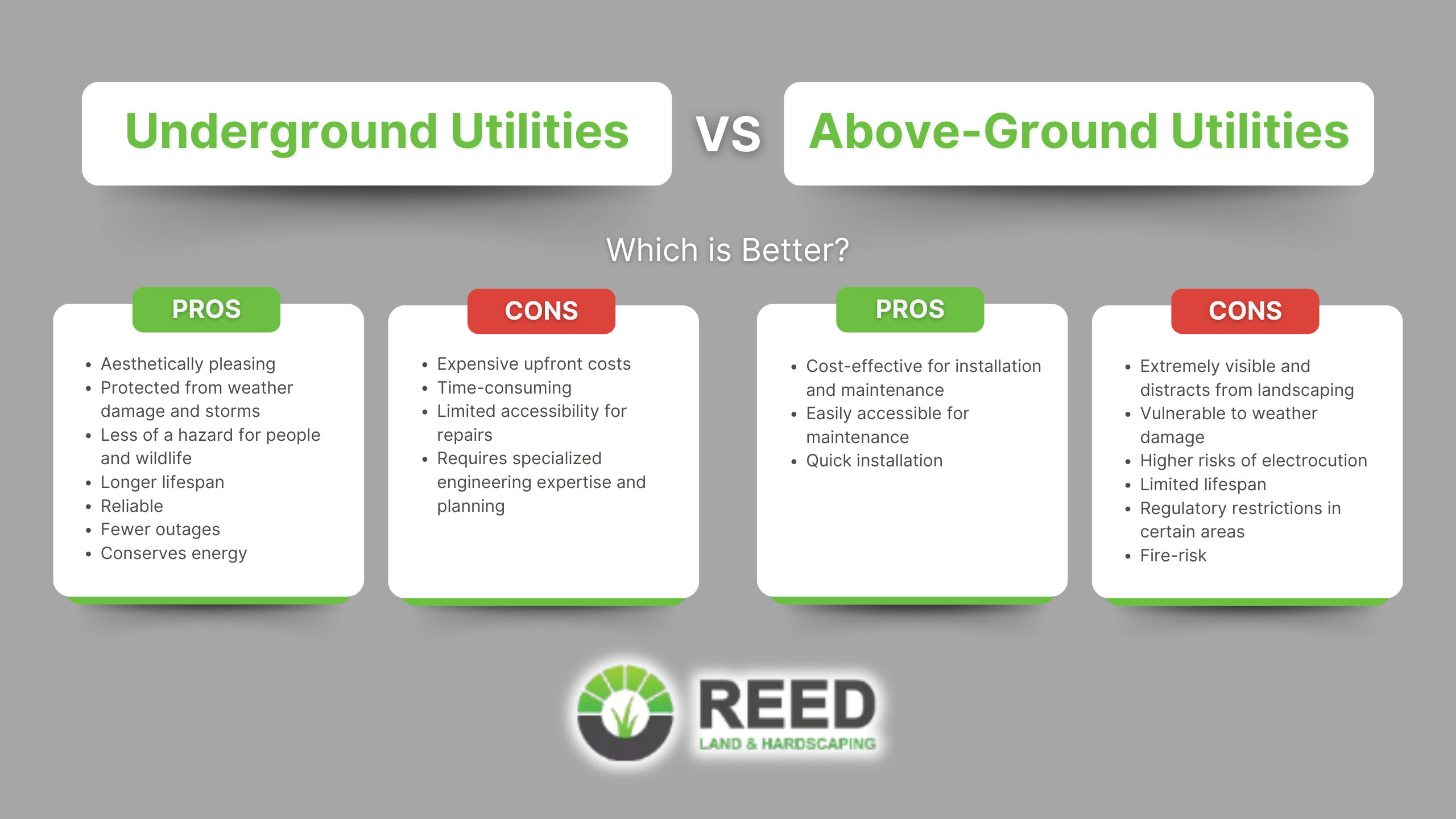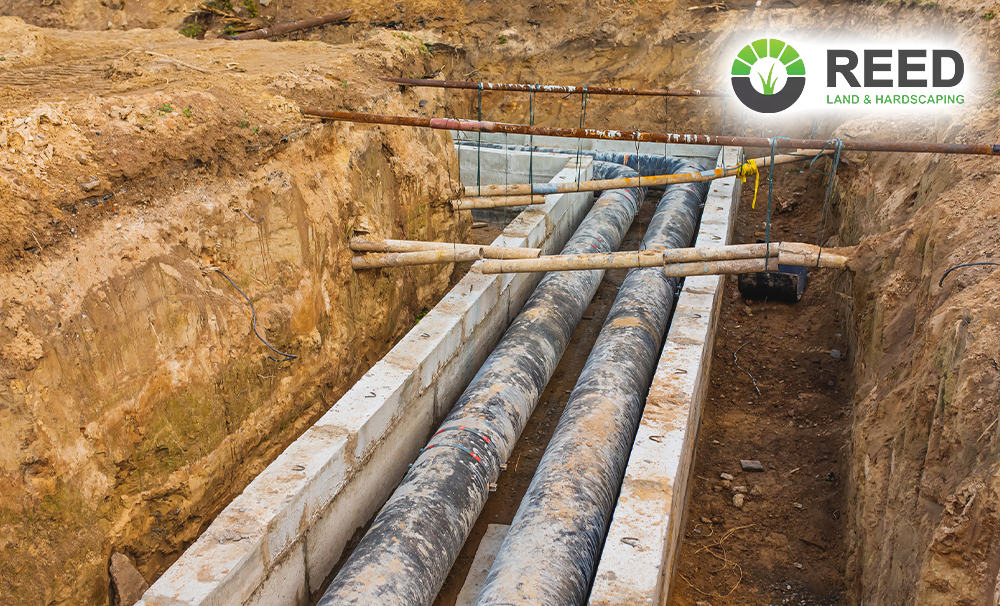Tennessee’s construction industry is responsible for building from the ground up and for what lies beneath it. For everything above the surface to operate smoothly, the utilities beneath the surface must be accurately installed and mapped. While we might not be able to see them fully appreciated, underground utilities are responsible for providing essential services to cities across Tennessee.
Underground utilities are the impressive network of cables, wires, and pipes beneath our cities to power our services and utilities. Instead of placing the infrastructure above ground, services like electricity, gas, water, sewage, and telecommunications take underground to provide residents with the same services but in a safer, more reliable, and environmentally friendly manner.
Join us as we unravel the intricacies of underground utilities and everything you need to know about them in Tennessee.
Underground Utilities Explained
As cities grow and expand, so does the demand for utilities to be placed underground. Underground utilities are public service infrastructures installed below ground to provide essential services to homes and buildings. They include electrical lines, telecommunication, traffic signal lines, water service, sewer systems, gas lines, and oil pipelines. These utilities work by transporting water, electricity, or gas through their pipes or cables from one place to another. For example, the water pipes underneath our houses bring clean water to our homes.
When someone needs to dig or excavate underground, they must be careful not to damage these utilities. The process involves utility locating and mapping to ensure pipes and lines aren’t accidentally in the way or crossed. Accurate mapping and documentation help eliminate excavation concerns, as Tennessee law requires. Then, they can start digging carefully, sometimes by hand or with machines designed not to harm the underground pipes and cables. The work is tedious as they work cautiously to avoid accidents and keep the utilities working smoothly.
Why are Underground Utilities Important in Tennessee’s Landscape
In Tennessee, underground utilities are essential in supporting the state’s growth and development. These underground systems can significantly benefit landscaping jobs across Tennessee in three main ways:
- Preserving Tennessee’s Beauty: By keeping utility lines and infrastructure underground, landscaping professionals can design and create masterpieces without above-ground utility poles and wires getting in the way. This space opens the door for more creative landscaping options and contributes to the overall beauty of outdoor spaces across Tennessee.
- Enhancing Safety: Underground utilities help create a safer work environment for landscaping crews by reducing the risk of accidental contact with electrical lines. This safe work environment is particularly crucial in a state prone to tornadoes, flooding, and extreme storms to ensure services and utilities remain reliable during emergencies. Additionally, underground utilities will help minimize the aftermath of accidents and storm damage.
- Uninterrupted Landscaping Projects: Underground utilities minimize disruptions to landscaping projects caused by maintenance or repair work on above-ground utilities. Being underground minimizes any disruptions, allowing landscaping jobs to move forward smoothly without interruptions.
As communities and cities in Tennessee continue to grow, underground utilities will remain a top choice for maintaining the state’s landscape while supporting the efficiency and safety of landscaping jobs.
How Do Underground Utilities Affect Landscaping Projects?
Underground utilities are preferred for their minimal visual impact on landscaping projects, allowing the landscaping to shine without distracting eyesores like above-ground utilities. However, improperly installed underground utilities can seriously affect landscaping progress. While landscaping projects enhance the beauty of the above-ground view, they can only maintain their beauty with proper maintenance and installation of underground utilities. Let’s take a look at how underground utilities can impact your next landscaping project:
- Safety: Since underground utilities intricately run beneath the surface, it can feel like navigating a labyrinth of pipes and lines. Digging without checking utility mapping charts could lead to accidental hits or damage to these pipes. This accidental damage can pose an extreme danger and potentially cut off essential services like water, electricity, or gas.
- Design Restrictions: Even if an area seems cleared for landscaping, it may not be clear for digging below. Knowing where underground utilities are can limit landscaping design options. Therefore, checking utility mapping early in the design process is important to avoid certain areas or adjust your design plans.
- Cost and Time: Accidentally damaging underground utilities can increase project costs and delay timelines. This damage adds to the original investment and slows progress, resulting in additional repair expenses and lost time.
- Utility Access: When designing a landscape, you want to ensure the layout doesn’t hinder utility workers’ access to underground utilities for maintenance or repairs. Planning the design can prevent obstruction of utility access points and ensure smooth operations for future maintenance needs.
Underground vs. Above-Ground Utilities: Which is Better?
Sometimes, when new techniques emerge in any industry, it’s natural for some people to feel hesitant about getting on board immediately. If you are unsure about adopting underground utility methods, don’t worry—we’re here to help.
Let’s take a closer look at both underground and above-ground utilities, breaking down the pros and cons of each method. By weighing the pros and cons, you will have the information to decide which approach you think is better.

In our opinion, the chart speaks for itself. Although installing underground utilities can be labor-intensive and more costly than above-ground utilities, the advantages outweigh them entirely. Modern construction is learning heavily about underground utilities, especially in cities. This shift isn’t just about efficiency and creating a safer and more sustainable environment for people, wildlife, and the community. Ultimately, underground utilities stand out as a step in the right direction in paving the way for groundbreaking techniques in the industry. The benefits of underground utilities over above-ground alternatives are clear, reinforcing the argument for their adoption.
Utility Marking Laws in Tennessee
Each state has its marking laws for underground utilities. Before starting any construction, landscaping, or excavation project, it’s crucial to check your state’s laws to ensure compliance.
In Tennessee, according to the Tennessee Underground Utility Damage Prevention Act, anyone planning excavation or demolition projects must provide notice three to ten days before starting. To begin, you need a TN811 ticket. This ticket confirms that you’ve contacted Tennessee’s statewide One-Call Center, Tennessee 811, which notifies utility members to mark their underground facilities before your excavation.
Before calling Tennessee 811, have the following information ready:
- Your name, company name (if applicable), phone number, and mailing address.
- Field contact information.
- Type of work to be done.
- The county, city, address, and nearest cross street of the proposed excavation site.
- Where on the property do you want marking done.
Taken directly from Tennessee 811’s website.
Tennessee 811 doesn’t mark lines themselves, but serves as a communication link between member utilities and excavators. This service is free but is required to help prevent injury and property damage.
Future of Underground Utilities
As technology continues to advance, the future of underground utilities looks promising. Emerging trends indicate a widespread adoption of underground utility practices, shifting away from above-ground alternatives. Already, we’re witnessing the integration of sensors, utility locator systems, and real-time data collection to enhance the safety and reliability of underground installations. With ongoing innovation, we will only see these technologies become more efficient in providing faster responses to issues.
Underground utilities offer solutions to many challenges posed by above-ground alternatives. They protect communities from extreme weather while minimizing visual impact in cities. Additionally, they facilitate the integration of smart infrastructure, renewable energy sources, and space-efficient designs. Technological innovation is driving progress in this field, making underground utilities increasingly popular. It’s only a matter of time before they become the industry standard.
Reed Landscaping
Finding a reputable landscaping company in Tennessee that understands underground utilities should not be difficult, especially with companies like Reed Landscaping around. Reed Landscaping assures you of the highest quality experience in excavation, grading, site utilities, and geotechnical remediation.
Reed Landscaping is Middle Tennessee’s most versatile landscape construction, hardscape, and site contractor. There’s no job that Reed Landscaping can’t handle, especially regarding commercial property grading! With extensive experience in landscaping in cities like Nashville and Brentwood, Reed Landscaping can provide professional services for any size project of any size. With the launch of our new website, Reed Landscaping is excited to showcase our completed projects and pictures here.
If you’re ready to start your project, please contact Reed Landscaping. Our team of landscaping experts will help you achieve the look and feel you are searching for on your next construction project.
Resources:
- https://www.tenn811.com/#:~:text=Tennessee%20state%20law%20
- https://www.tn.gov/tpuc/divisions/uudp-underground-utility-damage-prevention/uudp-underground-utility-damage-prevention-faqs.html#:~:text=Each%20person%20responsible%20for%20excavating,811%20or%20visiting%20Tennessee%20811.
- https://www.sikesconcrete.com/underground-utilities#:~:text=Above%20ground%20utilities%20are%20susceptible,less%20likely%20to%20be%20disrupted.
- https://trenchlesspedia.com/definition/3702/underground-utilities-excavation
- https://www.4manalytics.com/blog/underground-utilities-all-you-need-to-know
- https://www.gp-radar.com/article/unveiling-the-underground-the-advantages-of-undergrounding-utilities
- https://www.util-locate.com/future-trends-in-underground-utility-locating/

